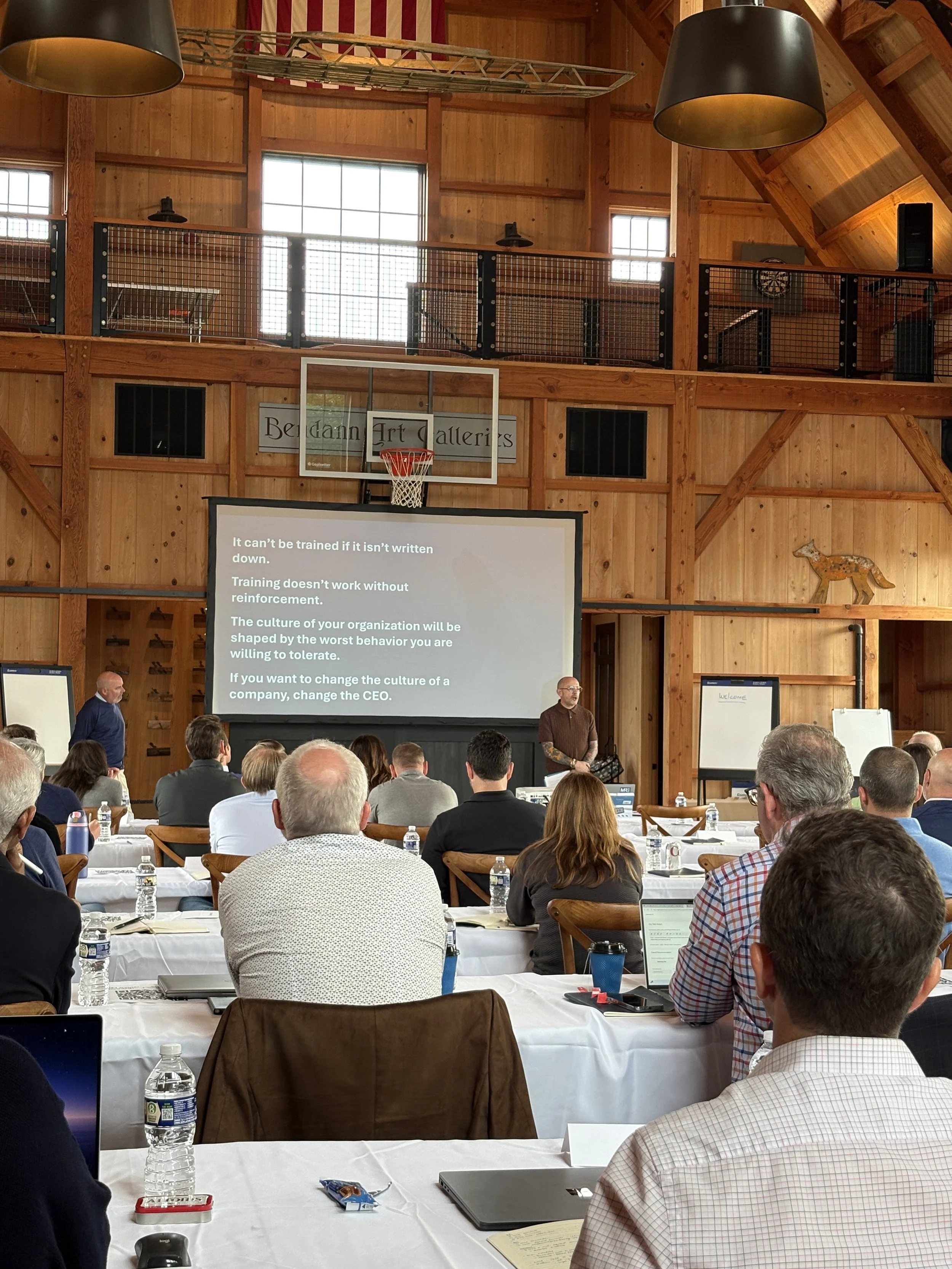MRE Capital Hosts Second Annual Executive Summit to Accelerate Growth Across Its Portfolio
MRE Capital welcomed CEOs and senior leaders from across its portfolio for its second annual Executive Summit, held September 22–24 at Northwest Point Farm in Centreville, MD. Over three days, executives explored how the MRE Growth Playbook can help accelerate company growth, strengthen cross-portfolio connections, and create space to learn from one another.
A highlight of this year’s program was an interactive session with Bill Carr, former Amazon executive and co-author of Working Backwards: Insights, Stories, and Secrets from Inside Amazon, who shared lessons on scaling innovation and execution that leaders could apply directly to their own companies.
Designed as a working session rather than a traditional conference, the Summit is about more than just metrics and margins—it’s about people, progress, and partnerships. It emphasizes community, shared learning, and the practical frameworks leaders need to build enduring, high-performing companies.
Throughout the summit, participants openly shared what’s working — and what’s not — where they’re stuck, and how to move forward in scaling mid-market companies. They traded best practices, challenged assumptions, and left with clear, actionable ideas to take back to their teams. Just as important, they built relationships and made time for camaraderie.
“We’re not just here to talk about growth — we’re here to drive it,” said David Williams, Founder, Chairman, and CEO of MRE Capital. “This summit brings together leaders who are focused on building strong cultures, scalable systems, and companies that can lead their markets — and our role is to help equip them with the structure, support, and shared playbook to do just that.”
Day 1: Building a CEO Community
The event opened Monday afternoon with a CEO Roundtable led by our CEO David Williams. Recognizing the excitement — and loneliness — of the CEO role, the session focused on creating a safe, high-impact peer network. Together, the group examined the realities of leading at scale, with Williams noting: “show me a great company and I will show you a great CEO.”
Discussion centered on what defines exceptional leadership, including ambition, determination, action orientation, balanced urgency, transparency, authenticity, curiosity, and the blend of IQ and EQ required to build enduring businesses.
CEOs also explored five fundamental areas for scaling:
Vision & Strategy — setting a bold ambition, clarifying the right to win
Executive Team Development — ensuring the right people are in the right seats
Metrics & Goals — defining key indicators, setting ambitious targets, aligning incentives
Management Systems — building meeting rhythms, accountability, and execution frameworks
Cultural Norms — articulating values, principles, and behaviors that drive performance
The group drew inspiration from Good to Great and outlined personal and organizational development plans. The CEOs were then joined by their leadership teams and the evening concluded with drinks and dinner, giving the group a chance to connect informally before the full summit got underway.
Day 2 – Morning: Scaling Great Companies
Tuesday opened with welcome remarks and company introductions, followed by an update on MRE Capital’s progress over the past year, and then two cornerstone sessions: Building & Scaling a Great Company and Using the MRE Growth Playbook.
Building & Scaling a Great Company
Led by Williams, this session explored what it truly takes to build companies that grow faster than the markets they serve while creating opportunity for employees and value for customers and shareholders.
He shared the reality that building a great company is hard, takes time, and hinges on the strength of the leadership team. He emphasized that great companies are customer-first, culture-driven, financially disciplined, and talent-focused — yet most organizations fail to realize their full potential.
The conversation examined why companies stop growing, from lacking a clear long-term vision and strategy to struggling with accountability, talent development, and disciplined execution. David walked through the five key areas of focus for scaling:
Vision & Strategy — setting a bold ambition and clear right to win
Executive Team Development — building the right team in the right roles
Metrics & Goals — defining critical indicators and aligning incentives
Management Systems — creating rhythms, accountability, and repeatable execution
Cultural Norms — establishing values and beliefs that drive performance
He challenged leaders to embrace growth as a non-negotiable priority, build well-documented strategies, invest in top talent, and create management systems that drive alignment and execution. The group discussed the stages of company growth — from founder-led to delegation-driven to fully systematized — and explored practical ways CEOs and their teams can distribute accountability, drive innovation, and avoid complacency.
Using the MRE Growth Playbook
The morning continued with a deeper dive into the MRE Growth Playbook, a framework introduced at last year’s summit and now embedded across many portfolio companies. Williams reflected on key learnings since launch: strong adoption in budgeting, meeting rhythms, multi-year planning, and financial reporting, but opportunities to go further in strategy development, priority setting, and culture-building.
Leaders explored how the Playbook is evolving to address the full spectrum of what it takes to scale — not just management systems, but also strategy, culture, and executive team development. The team shared how MRE wants to partner with executive teams through a structured engagement model: weekly check-ins with leaders, monthly financial reviews, quarterly strategy sessions, an annual planning calendar, and annual offsites to set vision and goals.
This session set the stage for the rest of the summit by underscoring that great companies require more than capital — they need aligned strategies, strong leadership teams, disciplined execution, and a culture that empowers growth. It also encouraged attendees to use the Playbook as both a diagnostic tool and a roadmap for accelerating scale in their own organizations.
Day 2 – Afternoon: Working Backwards with Former Amazon Executive Bill Carr
In the afternoon, attendees had the opportunity to hear from featured speaker Bill Carr, former Amazon executive and co-author of Working Backwards: Insights, Stories, and Secrets from Inside Amazon.
Carr joined Amazon in 1999 and spent more than 15 years with the company, serving as Vice President of Digital Media, where he launched and managed Amazon’s global digital music and video businesses — including Amazon Music, Prime Video, and Amazon Studios. Today, Carr is co-founder of Working Backwards, LLC, where he coaches executives at both large and early-stage companies on how to apply the management practices that fueled Amazon’s growth.
At the summit, Carr explored how Amazon built mechanisms to scale innovation and execution, sharing practical lessons on creating systems that enable organizations to move quickly while staying aligned. He offered a deep dive into how Amazon became an “invention machine” by embedding leadership principles, mechanisms, and disciplined operating rhythms across the company.
Carr also emphasized the power of narrative writing as a decision-making tool — a hallmark of Amazon’s leadership culture that relies on six-page written narratives over presentations to drive clarity, uncover assumptions, and enable high-quality discussion. Carr shared how this practice was embedded across key business rhythms—from launching new initiatives to reviewing quarterly performance—to help the company scale with speed and clarity.
Carr walked attendees through Amazon’s Working Backwards process — including the power of input metrics over lagging outputs, the PR/FAQ method for launching new initiatives, and the importance of a structured operating cadence to sustain innovation at scale. Through a mix of case studies and actionable frameworks, Carr helped attendees explore how these principles can be adapted to mid-market businesses to drive clarity, customer focus, and long-term results.
Day 3 – Morning: The Growth Playbook in Action & New Resources for Leaders
The final day spotlighted real-world applications of the MRE Growth Playbook. Leaders from each portfolio companies shared case studies on how they’re using key tools and frameworks:
Quality Brand Group (QBG) — Meeting Rhythm & Management Continuity
DJ’s Landscape Management — Monthly Financial Review
Advantage Services Group — Training Your Management Team
Curated Events — Strategy Rollout: What’s Working and What’s Not
Greenberg Gibbons Commercial — Rolling out the Growth Playbook
Trilliad — Activating Culture
To help these leaders operationalize the Growth Playbook, MRE also introduced three new Business Partners — seasoned experts who will work directly with portfolio company executives:
Libby Barden, Talent & People
Sean Creamer, Finance
Dave Paulus, Sales
These partners will provide direct support to executives and help accelerate long-term, sustainable growth across the portfolio. Learn more about our Business Partners here.
MRE Partner Jon Schwartz then walked attendees through the 2026 budget process, outlining MRE’s approach to building ambitious, data-driven plans that support growth while maintaining disciplined execution.
He emphasized linking budgets directly to each company’s multi-year strategy and critical metrics, keeping forecasts visible and actionable, and fostering an “all-hands-on-deck” mindset to stay on track throughout the year. Schwartz also highlighted the importance of clarity around growth drivers, talent needs, and performance trends to support informed decision-making. To close, he reviewed the contents of the 2026 Budget Pack—providing leaders with a clear roadmap for execution and accountability.
To close out the summit, Williams challenged each participant to set personal growth goals and business growth priorities for the year ahead, and attendees shared what they took from their time together at this year’s event.
A Culture of Shared Growth
The 2025 MRE Executive Summit underscored MRE Capital’s belief that great companies are built by great leaders — and great leaders thrive in strong communities. By combining patient capital, hands-on operating expertise, and a culture-first mindset, MRE continues to help its portfolio companies scale with confidence.
“Our goal isn’t just to advise—it’s to help leaders execute,” said Williams. “This summit reinforced what we believe great partnerships look like: shared accountability, practical operating frameworks, and a culture of continuous learning. When we align around a common playbook, we unlock the ability to scale customer-first businesses with clarity and confidence.”
Thank you to all the leaders who joined us — your openness, collaboration, and commitment to growth made this summit a success. We can’t wait to see the impact you’ll create in the year ahead!











































